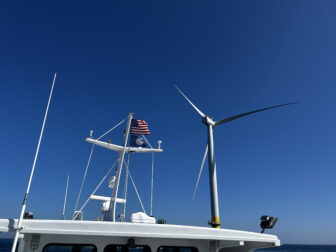You don’t need to look hard at census data to see that Virginia and Georgia aren’t very different. With booming populations, a host of technology entrepreneurs and a business-friendly climate, they are both among the most dynamic economic hot spots in the country.
But here’s a crucial difference: In Georgia, Gov. Brian Kemp is turning that state into one of the leading electric vehicle manufacturing hubs in the nation. Meanwhile Gov. Glenn Youngkin has just rejected a bid by Ford Motor Co. to build a massive battery manufacturing facility in Southern Virginia.
One of these southern powerhouses is racing toward the future. The other, Virginia, is deliberately turning its back on 21st century transportation investments. The reason for rejecting Ford? Youngkin points to vague benefits to the Chinese government. But workers in his state must wonder what their governor has against them.
Other states have taken a better route. Driven by the historic investments from last year’s Inflation Reduction Act, new battery manufacturing plants are planned across the country, with Kentucky, Tennessee and Michigan joining Georgia in leading the way, according to the Department of Energy. Over just the last two years, planned investments in the U.S. battery and electric vehicle manufacturing sector quadrupled to $210 billion, more than the annual economic output of Kentucky, according to a report from Atlas EV Hub.
In Georgia, $23 billion of investments in the electric vehicle sector — including from Hyundai Motor Group and Rivian — have been announced, projects that the state says will create about 28,000 jobs.
“I’m fulfilling my promise of creating good-paying jobs for our state,” Kemp told Politico recently, discussing his push to turn the Peach State into the “electric mobility capital of America.” Republican governors from Indiana, Ohio and Tennessee have also recognized that this is where the vehicle market is going — and they want their states to drive this transition.
All of which underscores how Youngkin seems to be driving his state into a ditch.
To expand its domestic supply chain and cut its dependence on imports, Ford is looking to invest in a plant to make lithium iron phosphate batteries in a partnership with a company called Contemporary Amperex Technology (CATL). The $3.5 billion plant would have created an estimated 2,500 jobs in the struggling southern realm of the Virginia, according to the Richmond Times-Dispatch.
However, Youngkin decided to remove Virginia from consideration for the plant because of his concerns about CATL, which has ties to the Chinese government. This despite the fact that there are already many economic and cultural connections between Virginia and China.
Now, those jobs are going elsewhere. One political observer told the Times-Dispatch that the speculation is that Youngkin’s sudden decision to pull out — which came after the project had been in the works for some time — has more to do with Youngkin’s presidential aspirations than any considerations for Virginia’s economy. If so, that’s a funny way to run for higher office: Politicians often run on their ability to attract jobs and grow the economy, not reject jobs and harm the economy.
Recognizing the benefits of manufacturing investments, state leaders will often promise just about anything to get companies to invest within their borders. Sometimes these tax breaks and promised investments don’t quite add up. This time those incentives make total sense for three key reasons.
First, this is a new industry, one that is primed for dramatic growth. While new vehicle sales fell overall by 8% in 2022, electric vehicle sales grew by a stunning 65%, totaling 5.8% of all new vehicle sales last year. Analysts have been looking at the strong growth and predicting a rapid doubling or tripling of those sales. President Joe Biden has laid out the goal of having half of all U.S. vehicle sales be electric by the end of the decade. We might get there even sooner.
Second, the climate bill Congress passed last year includes record incentives to build out the domestic U.S. electric vehicle supply chain. Those include both new tax credits for everything from mineral refining to battery assembly, as well as expanded consumer credits that reward vehicles built domestically. In part because of these new incentives and requirements, there has been a whopping $40 billion in new clean energy investments announced since Biden signed that bill into law.
Third, clean energy jobs are good jobs. The average hourly wages for clean energy jobs overall are about 25% higher than the national median wage, and those jobs are more likely to come with health care and retirement benefits than jobs across the rest of the private sector, according to a 2020 report by E2.
Soon after he took office, Youngkin wrote in the Post that there are 600,000 former Virginians living “in states that we directly compete with.” He tried to blame liberals in Richmond, but, given the good, new jobs now moving to Georgia, Tennessee and Kentucky, that number may soon be growing.
By Mike Tidwell. Original published at the Danville Register & Bee.





